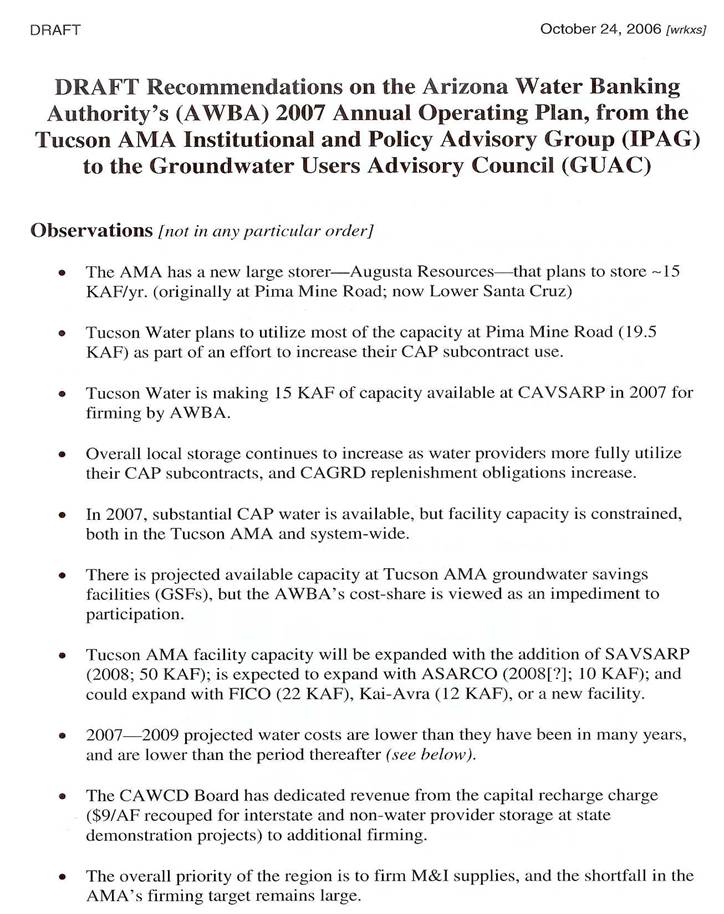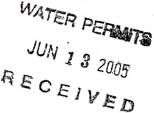 One North Central Avenue, Phoenix, AZ 85004 . (602) 366-7826
One North Central Avenue, Phoenix, AZ 85004 . (602) 366-7826
William E. Cobb
Director, Environmental Department

June 13, 2005
Michele Robertson
Arizona Department of Environmental Quality
1110 West Washington Street
Phoenix, Arizona 85007
Re: Phelps Dodge Sierrita Inc. Aquifer Protection Permita; Community Water Company Water Supply Replacement
Dear Ms. Robertson:
As presented in this letter, Phelps Dodge Sierrita Inc. ("PDSI") is pro-actively addressing sulfate conditions downgradient from its operation in Green Valley that have created aesthetic impacts to drinking water supply wells operated by Community Water Company ("CWC"). The steps taken by PDSI and CWC to locate alternative water sources for CWC have substantively altered the basic assumptions used by the Arizona Department of Environmental Quality (ADEQ) in preparing the draft aquifer protection permit (APP) for PDSI. In addition, PDSI is prepared to implement additional characterization and proactive remedial actions to address sulfate conditions in groundwater downgradient from its Sierrita operation, but proposes to use a remediation-based approach rather than a compliance-permit approach to implementing those actions.
On June 1,2005, PDSI and CWC entered into an agreement that will allow CWC to utilize three (3) PDSI wells (i.e., Esperanza wells 1,2, and 3) in lieu of two (2) CWC's wells that have shown elevated concentrations of sulfates. The water quality in Esperanza wells 1, 2, and 3 have sulfate at background concentrations and, therefore, there is no point of use well currently being used by CWC that is being adversely impacted by the sulfate plume. However, because a permanent solution has not been fully identified, CWC's use of PDSI's wells and associated distribution system is temporary.
While the referenced agreement is in place, CWC and PDSI will be cooperatively searching
for and evaluating various replacement supply options. PDSI recognizes that CWC must respond to the demands of its customers and that CWC's system inherently requires
redundancy of supply. Similarly, PDSI desires to insure that CWC's ability to obtain reliable water production that meets reasonable customer expectations for both health-based and aesthetic qualities are not inhibited by PDSI operations. However, CWC has indicated to PDSI that
if a long-term solution cannot be identified, CWC will need to utilize its impacted wells in
Page 2
June 13, 2005
the near term in order to meet pending arsenic standards. Nonetheless, both parties are confident that a timely, permanent solution will be identified.
The actions implemented to date and planned in the near future represent a changed set of conditions regarding the draft APP. The point of use well identified in the draft permit (Esperanza 4) is not valid because it is an industrial water supply well that will never be used for drinking water purposes, and PDSI is not aware of any impact on industrial uses associated with sulfate concentrations. With the change in CWC well usage and the identification of a permanent alternate water supply, there will be no current point of drinking water use in the aquifer downgradient of the Sierrita operations that is or will be threatened by the sulfate conditions. Finally, a remedial action (alternate water supply) discussed in the Contingency Plan portion of the draft permit has already been implemented.The factual and legal concerns with the draft APP identified by PDSI and its counsel have been provided to the agency under a separate cover letter along with redline comments on the draft permit. We will keep you apprised of our progress with CWC in turning the interim remedial action (i.e. - the temporary use of the Esperanza wells) into a final remedial action (i.e. permanent water supply replacement).
I believe that the groundwater conditions downgradient of the PDSI site represent a unique opportunity for Innovative thinking on the parts of ADEQ and Phelps Dodge regarding environmental protection in Arizona. PDSI has demonstrated its commitment to both environmental protection and long-term water supply for CWC by implementing a key component of the contingency plan identified in the draft APP, which is providing an alternate water supply. PDSI is prepared to address the sulfate conditions in a proactive manner and proposes that remedial efforts be conducted under a regulatory mechanism designed for remediation, such as the Voluntary Program. There are multiple benefits in addressing the sulfate conditions in this manner, including the use of broader Phelps Dodge resources (both technical and financial) for remediation purposes as well as eliminating the need for further legal dialogue on the issues raised in PDSI's comments on the draft APP.I am available at your convenience to discuss the benefits of our proposed approach.
Very truly yours,
s/William Cobb
cc: Patrick Cunningham
Joan Card
Karen Gaylord